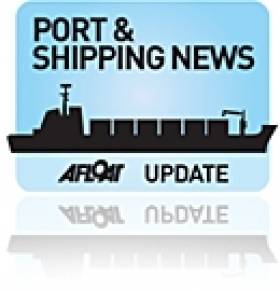Displaying items by tag: Paris MOU on Port State Control
#DetentionLifted – The detention of a Dutch flagged general cargoship in Wicklow Port since the weekend has finally been lifted as the vessel is no longer currently listed by the Paris MoU, writes Jehan Ashmore.
Crown Mary had arrived to Wicklow last week to where packaged timber was discharged, however the 2,622 gross tonnage vessel was detained by the Paris MoU. Ireland is a member of The Paris MoU (Memorandum of Understanding) on Port State Control (PSC) that came into effect in 1982. This has enabled the international organisation to eliminate the operation of sub-standard ships through a harmonized system of PSC.
The detention of the Crown Mary that only dates to 2010, involved the Irish PSC authorities to carry out an inspection of the vessel. This led to the 88m vessel shift berths to the port’s non-commercial East Pier so to free up the berth at the Packet Pier for another Dutch flagged cargoship, Thea Marieke. This similar sized vessel on Monday then called to Dublin Port to where that same day the then detained Crown Mary was originally next bound.
Instead Crown Mary remained in Wicklow to resolve matters pertaining to the detention that was lifted yesterday. This saw the ship depart last night not for Dublin and given the circumstances notably without a return cargo. As such the ship sailed 'light' and is bound for Harlingen, the Netherlands.
New Inspection Regime for Ships and Yachts in Europe, Russia, Canada
Yachts in Europe, Russia or Canada will face new marine safety inspections from 2011 following the implementation of the Paris MOU's New Inspection Regime (NIR), Sail World reports.
Previously only 25% of ships and very few yachts were inspected at ports in countries signatory to the Paris Memorandom of Understanding on Port State Control, which includes most maritime countries in Europe as we as Russia and Canada.
But the introduction of the NIR sees a shared commitment to inspect all ships and boats visiting ports in the Paris MOU region.
Vessels will be inspected under such categories as type of vessel, age, flag, class society, owner and/or manager and inspection history. A 'Ship Risk Profile' will also classify vessels as either low risk, standard risk or high risk, requiring inspections every two years, 12 months and six months respectively.
The NIR has courted controversy among boat owners due to the requirements for classification as a Low Risk Ship, which state that the flag in which a yacht is registered must be included on the Paris MOU's approved 'white list'. At present only 16 flags have such approval.
Meanwhile, the region's 'black list' - which represents flags of countries considered high risk - lists a number of Caribbean states.






























































